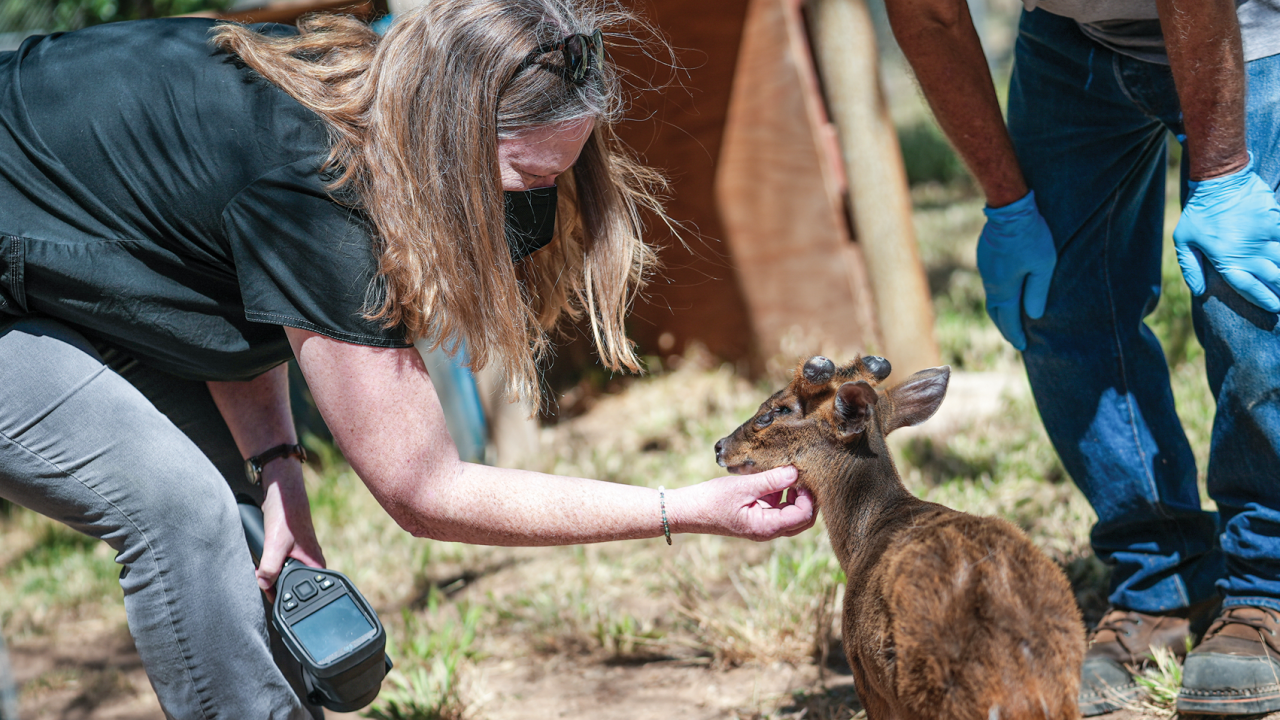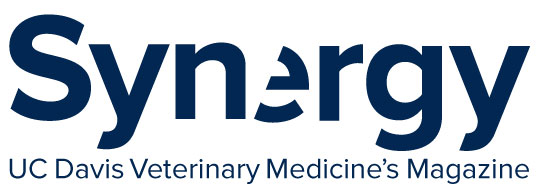
A Day in the Life
Second Chances
While Dr. Dolittle may have “talked” to the animals, it’s the capacity to listen that gives Dr. Jackie Gai ’01 guidance in treating the wildlife who live with the Performing Animal Welfare Society (PAWS).

“My approach to my practice is to be of service to my patients, many of whom have histories of abuse or neglect. I ask them, how can I help or serve you?” Gai said. “This isn’t about me; it’s about them. Putting my ego aside quiets my mind and helps me ‘hear’ the cues they give me; it’s almost a meditation. Their energy is a humbling experience.”
Gai has worked with PAWS for more than 20 years, starting shortly after graduating from the UC Davis School of Veterinary Medicine in 2001. During a short post-grad stint at a small animal practice in Marin County, Gai got a call out of the blue from Pat Derby, PAWS’ beloved late founder. “She was looking for a veterinarian with elephant experience who was concerned about their welfare,” said Gai, who now serves as director of veterinary services for PAWS. “It was the perfect match.”
Gai became passionate about animal welfare issues in captive wildlife while working as a zookeeper and veterinary technician at the Oakland Zoo, years before pursuing her DVM. One of the African elephants had a surprise birth in 1995. The calf, named Kijana, was rejected by his mother (not uncommon in captive elephants, but rare in the wild) so Gai and seven other keepers cared for him around the clock.
This isn’t about me; it’s about them. Putting my ego aside quiets my mind and helps me ‘hear’ the cues they give me; it’s almost a meditation. Their energy is a humbling experience.”
Despite his careful hand-raising and care, Kijana died of a herpes virus infection at 11 months old. He was only the second elephant in the U.S. to come down with the disease and the first African elephant. That experience made Gai more acutely aware of medical issues brought about by captivity that aren’t adequately addressed by exotic animal medicine textbooks. It also awakened a passion for the welfare of all captive wildlife that she carried into her role at PAWS.
The sanctuary was founded in 1984 as the first elephant refuge in the country and now includes a 2,300-acre site in San Andreas, Calif. that provides a home for former victims of exotic and performing animal trades. Residents currently include seven tigers, seven elephants, two black bears, two adult capuchin monkeys, a mob of emu, and an elderly Indian muntjac. →
Article continues after images.



We give [the animals] more agency in making decisions. Sometimes they need more space or to get away from a bullying situation. It’s an honor to help facilitate their healing—on physical as well as psychological and spiritual levels."

“We can’t return these animals to the wild unfortunately, so in our case, we’re improving their lives,” Gai said. “They often come from limited space where social conflict and a lot of dysfunction can arise. We’re giving them a better version of captivity. It’s not perfect, but it’s the best we can provide.”
The PAWS team of caretakers and veterinarians gets to know each animal that comes into their care as an individual with a different past and varying needs to feel safe, nurtured and able to live their best lives.
“We give them more agency in making decisions,” Gai said. “Sometimes they need more space or to get away from a bullying situation. It’s an honor to help facilitate their healing—on physical as well as psychological and spiritual levels. And it’s rewarding to see how some of their personalities change after coming to the sanctuary.”
Gai knows from personal experience the value of having someone give you what’s needed for your best outcome. After two other careers in law enforcement and entertainment ticket sales, Gai finally decided to pursue her biggest dream of becoming a veterinarian. She had to work full time while attending night school to finish prerequisites and get over the misconception that she was bad at math and science.
Fortunately, she found a small night class at Oakland’s Merritt College for organic chemistry—often considered the gatekeeper for those wanting to pursue a medical career. She said the instructor was a wild, deep thinker (and also a Sufi dancer!) who got the students fired up about science. Gai sat in the front row, glued to every word. “He helped flip the switch in my brain and I found out science is fascinating! It’s the basis of all life—that’s not a boring subject!” Gai said.
Once she succeeded there, Gai began chipping away at not only the other prerequisites for applying, but also the many years of a self-doubting voice that had told her she wasn’t smart enough. It took three attempts to be accepted to UC Davis, but that was the only place Gai would apply. It was where she knew she needed to be.
“There are so many paths to where you want to go in life,” Gai said. “Have patience. Finding your way is not a linear route and it can be easy to become discouraged. Sometimes life experience helps get you there too.”
